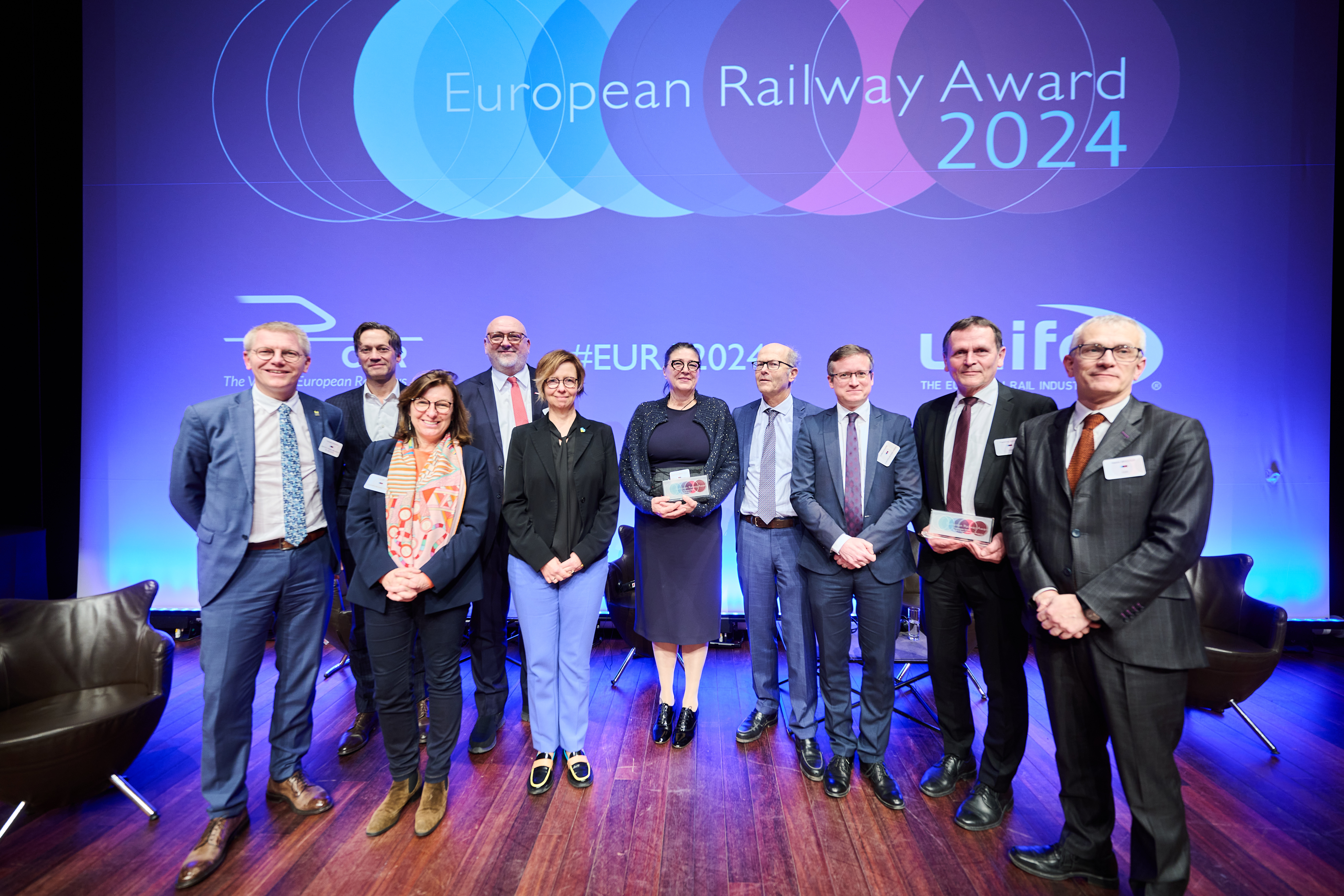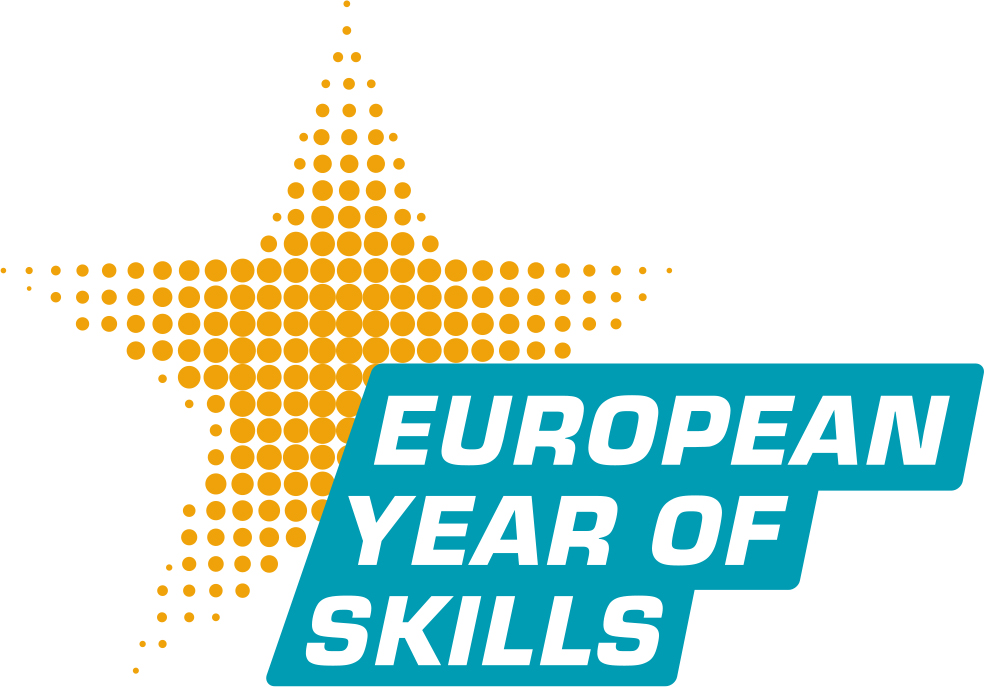European Year of Skills celebrated at the 2024 European Railway Award
The 2024 European Railway Award, jointly organised by the Community of European Railway and Infrastructure Companies (CER) and the European Rail Supply Industry Association (UNIFE), was held in Brussels today in a 17th edition marking the European Year of Skills.
Former European Transport Commissioner Violeta Bulc was awarded the event’s Rail Champion prize for her work promoting women in transport professions, while the Rail Trailblazer prize went to a project by Danish State Railways (DSB) pioneering a new train operator profile for their S-trains. The awards were bestowed during a prestigious ceremony at Belgium’s Royal Museums of Fine Arts, opened by European Commission Executive Vice-President for the European Green Deal Maroš Šefčovič and, for the Belgian Presidency of the EU, Belgian Deputy Prime Minister and Minister for Mobility Georges Gilkinet.
Opening the event Maroš Šefčovič, European Commission Executive Vice-President for the European Green Deal declared: “Greening mobility must be the new licence for the transport sector to grow. There is no doubt that Europe needs a strong railway system to maintain its competitiveness, while also staying on track to reach our climate and biodiversity targets. A successful implementation of the European Green Deal in the transport sector depends greatly on the development and innovation of the rail market.”
Representing the Belgian Presidency of the EU, Georges Gilkinet, Belgian Deputy Prime Minister and Minister for Mobility asserted: "In a groundbreaking move towards a sustainable and connected future, the recent agreement on the Trans-European Transport Network Regulation provides a clear, long-term vision for European railway infrastructures. Such vision needs substantial financial resources. This is the reason why the Connecting Europe Facility Program is pivotal, requiring a well-financed third CEF call to support our ambitions and address the imminent challenges posed by global warming, as our infrastructure faces the heat, both literally and metaphorically. We must wisely invest to reach both our economic and environmental goals. To do so, attracting diverse talent is crucial for the sector's future, and I applaud recent agreements, such as the European social Partner Agreement on Women in Rail, while stressing the importance of inclusivity for a sustainable and vibrant railway industry."
The European Railway Award's Rail Champion title is an honorary recognition jointly bestowed by the two associations. With this year’s prize, CER and UNIFE wished to recognise the efforts of former European Transport Commissioner Violeta Bulc to bring more diversity to transport professions, where women have long been underrepresented. Ms Bulc notably spearheaded the Women in Transport Platform for Change, a stakeholder forum that exists to this day and continues to give real impetus to the issue. Her call to attract more women to careers in transport resonated with the rail sector, which has in recent years redoubled its efforts to increase the number of women working in rail, leading to tangible results.
In her acceptance speech, Ms Violeta Bulc said: “I am deeply honoured and profoundly touched by the award given to me by the railway community, which I perceive as a testament to the dedicated efforts of the entire transport ecosystem during my tenure. It is also a tribute to the collective excellence of President Juncker's team. Transport serves as the vital thread connecting communities and fostering relationships. When transport functions seamlessly, society thrives; conversely, when transport stops everything stops. Therefore, those working in the transport sector bear the weight of society on their shoulders. Railways, in particular, play a leading role within the sector in crucial areas such as environmental sustainability, safety, and facilitating a modern lifestyle. While on the move, passengers can enjoy a comfortable space for work, conversations, relaxation, and the enjoyment of scenic views, minimizing the hassles of travel to city centres. It is also undeniable that railways play a pivotal role in the efficient movement of inland cargo within the EU single market and beyond, contributing to the success and competitive positioning of businesses of the European Union.”
Selected by a jury of policy makers, sector experts, and journalists, the 2024 Rail Trailblazer prize went to DSB’s S-train operator project – a recruitment initiative that successfully harnessed the benefits of digital transformation to create a new job profile tackling skill gaps, attracting new talent, and increasing diversity.
Juror Mr Ondřej Kovařík, Member of the European Parliament, announced the winner on stage, stating: "I would advocate for a railway sector that is attractive for skilled talents. A sector that goes beyond mobility, excels in innovation, combines state of the art engineering and manufacturing with new digital technologies. A true gateway to the future."
The project came about with the introduction of a new digital signalling system on the Copenhagen S-trains. The task of running these trains changed and DSB seized the opportunity to create a new ‘S-train operator’ profile. The fast-track application process and the shorter, more focussed training compared to classic train drivers created the possibility to target a broader variety of applicants typically received, whilst at the same time maintaining the high level of railway safety and benefiting the company as a whole. The success of the project was clear from the first recruitment rounds, which attracted record numbers of applications including double the number of women applicants. Overall it has led to greater diversity among employees (gender, age, educational background,...), a wider talent pool and optimised learning and operations, also benefitting classical train drivers' education, training and recruitment.
Flemming Jensen, CEO of DSB, was present to collect the Award, stating: “I am proud and honoured to receive this award on behalf of all the colleagues at DSB who have worked with dedication on this project. With the development of the S-train driver training programme, we have created a role that not only establishes a strong foundation for diverse recruitment but also ensures that the position is more in line with technological advancements and future demands.”
The Rail Trailblazer trophy is accompanied by a €10,000 donation to the charity of the winner’s choice. Mr Jensen selected the Danish Red Cross, with whom DSB has a long-standing cooperation.
The European Year of Skills provided a highly relevant focus area for this year’s ceremony. Relying on a broad and highly skilled workforce, the rail sector is particularly aware of the challenges of attracting and training workers that are well-equipped for the digital and green transitions. From gaps in skills, to an ageing workforce, there are numerous obstacles to overcome to ensure rail has access to the skilled labour it needs. Nevertheless, a renewed enthusiasm for rail as a green transport mode is inspiring younger generations to explore rail careers. Besides paying tribute to the impressive work being done to attract, train and retain new talent in the sector, the event debated how to redefine the skill landscape for the future of rail during a roundtable discussion, where the UNIFE and CER Chairs were joined by Members of the of the European Parliament and the European Commission.
Representing the European Parliament Tilly Metz, underlined: “The shift-to-rail presents new opportunities. Digitalisation leads to labour openings that need to be met with skill development. As part of the Green Transition, the modal shift will have to be inclusive. Women need to become integral to the sector and be given the tools to engage in transport professions.”
Magda Kopczyńska from the European Commission Director-General for Mobility and Transport, stated: “Having a workforce with the right skills is key to achieving sustainable growth, enabling innovation and improving companies’ competitiveness. But acquiring new skills is also essential to enable people to adapt to a changing labour market. This is why the issue of skills is a priority for the Commission, and why the ongoing European Year of Skills was launched last year.”
Michael Peter, UNIFE Chair and CEO of Siemens Mobility, commented on the significance of the Award: “We are living in exciting times with digitalization transforming the way we travel and transforming the way we live. To help us deliver a digital and sustainable future, we must attract the best talent to shape the rail industry and maintain our global leadership”
Andreas Matthä, CER Chair and CEO of Austrian Federal Railways ÖBB, took the opportunity to underline: “A European strategy against labour force shortage must include actions in many policy areas. This will be a huge entrepreneurial, political, and social effort. Overall, I see three major challenges: Firstly, we must improve gender balance, ensure compatibility of family life and career for all, and achieve equal pay at last. Secondly, we must offer older colleagues the opportunity to stay in their jobs longer including reorientation in their later career, and reassignment of physical activities if desired. Thirdly, let’s give the young people who have migrated to Europe a chance to make their contribution here.”
First organised in 2007, the European Railway Award celebrates and recognises outstanding contributions to the rail sector. The 2024 Award ceremony attracted hundreds of guests from across Europe, including local, national, and EU-level politicians and transport stakeholders.
 For further information, please visit our X channel @EU_RailwayAward and www.europeanrailwayaward.eu.
For further information, please visit our X channel @EU_RailwayAward and www.europeanrailwayaward.eu.
 |
